In today’s digital age, the options for acquiring DJ music are vast, and navigating this landscape can be overwhelming. From record pools to streaming platforms, each service comes with its own set of pros and cons. Do you prioritize an extensive back catalog or the latest club bangers? Are you after curated playlists that do the heavy lifting for you? Or do you want to ensure you’re always ready for that unexpected song request that catches you off guard?
In this guide, we’ll cut through the noise and simplify the diverse topic of where DJs get their music from. We’ll explain the key factors that should influence your decision – from music variety and cost-effectiveness to audio quality and exclusive perks. Whether you’re an aspiring DJ looking to start your journey or a club veteran seeking to refresh your crates, you’ll find insights to elevate your music game.
Prepare to discover the secrets to building an impressive music collection that will keep your audience buzzing with anticipation for your next set. Let’s cue the track on this journey and discover where the world’s top DJs really get their music from.
DJ Record Pools
As a DJ, having access to the latest tracks, exclusive remixes, and DJ-friendly edits can set you apart from the crowd. Enter DJ record pools – the music industry’s best-kept secret for staying ahead of the curve. These subscription-based services not only offer a treasure trove of high-quality tracks (typically as 320 kbps MP3 files), but they also boast a vast back catalog of music that spans various genres and eras. Having access to a vast library for a fixed price ensures you’ll find the perfect track for any moment in your set, all without breaking the bank. Let’s dive into the top record pool options.
BPM Supreme
BPM Supreme boasts an impressive back catalog that spans multiple genres, making it a go-to choice for open-format DJs. Their curated playlists simplify the process of crafting the perfect sets. With thousands of tracks from over 100 record labels, BPM supreme offers daily uploads with the latest music releases including exclusive DJ versions such as radio edits, 8-bar intro/outro versions, acapellas, and instrumentals. Gone are the days of being chained to your laptop. BPM Supreme’s sleek mobile app allows DJs to preview music, create playlists on the go, and batch download straight to your computer. Starting at just $22.99/month, BPM supreme offers very good value for serious open-format DJs. Use our exclusive code “Deftdj” to slash 25% off your first month and start filling your crates with hits.
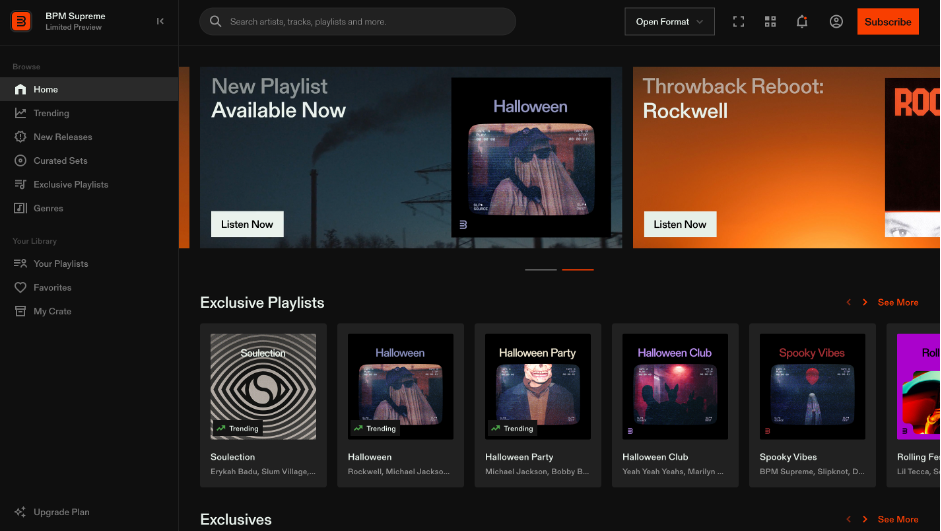
Franchise Record Pool (FRP)
FRP features a strong back catalog focused primarily on hip-hop, R&B, and top 40 hits. Their daily uploads of fresh music include other genres such as pop, reggae, soca, and jazz to name a few. In addition to on-the-go track preview and desktop downloads, FRP’s SPINS app features an AI tool that provides DJs with live track recommendation based on the current track being played. Curated sets are also available but only if you download the SPINS app. Subscriptions start at $19.99/month. For the hardcore hip-hop and R&B DJ, FRP is definitely worth checking out.
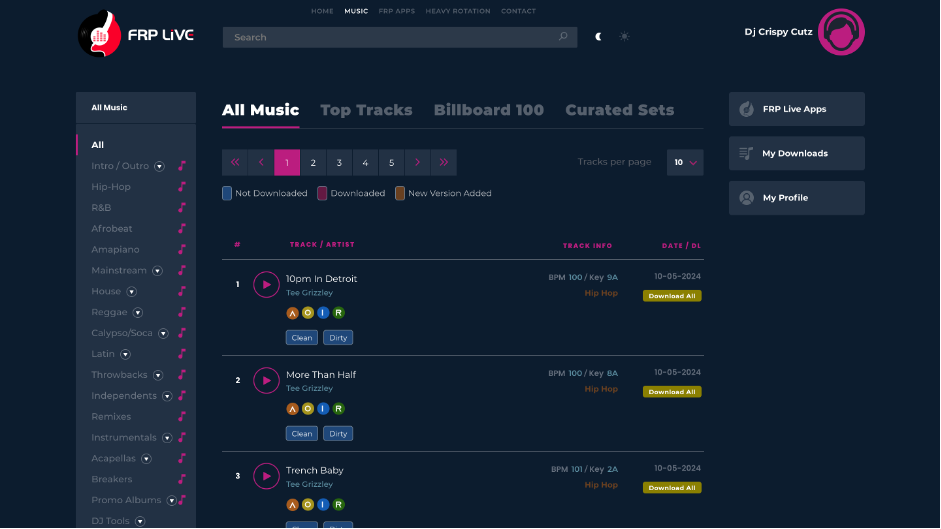
Crate Connect
Crate Connect is making waves in the record pool scene with its innovative approach to music discovery. At its core is an AI-powered recommendation system the learns from your downloads to curate a personalized selection of tracks tailored to your unique style. Despite being a relative newcomer, Crate Connect boasts a rapidly growing, genre-diverse catalog of music. Like its competitors, Crate Connect offers exclusive intros, edits, and remixes, along with a mobile app, Crate Connect GO, for on-the-go music exploration. What sets them apart is their offering of high-fidelity 1411 kbps WAV files that ensure you sound impeccable on top-tier sound systems. While their library may not be the most extensive, Crate Connect’s budget-friendly pricing structure – starting at $22/month and dropping to $16.50/month for longer commitments – makes it an attractive option for emerging DJs looking to build multi-genre collections without overspending.
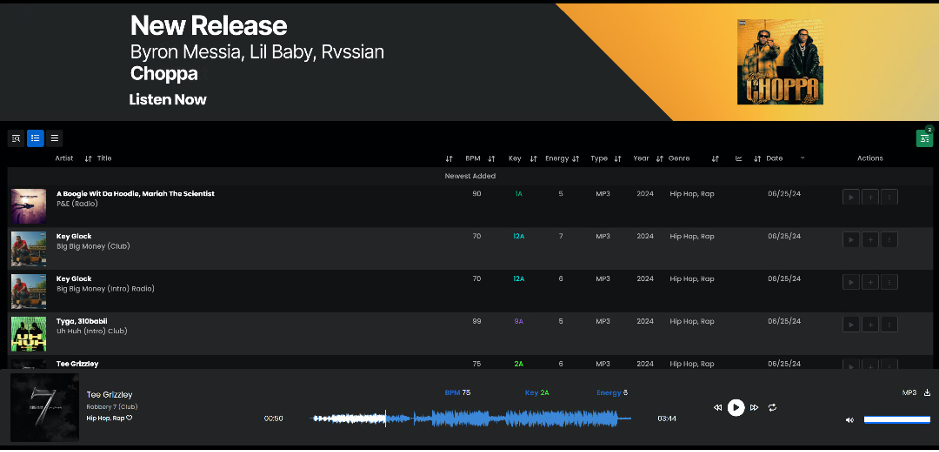
ZIPDJ
ZIPDJ excels in electronic dance music (EDM), uploading thousands of new tracks weekly from over 4,000 major labels and indie imprints. With a substantial catalog that spans over 60 genres, ZIPDJ is known for providing early access to new promotional music, often weeks ahead of official release dates. The platform also features curated “Essentials” download packs, making it easy to quickly build your music library. Accessing ZIPDJ is simple through your smartphone’s web browser, allowing you to create playlists and queue downloads on the go. Once you’re back at your computer, simply sync and download. With subscription plans starting at $25/month and going up to $50/month for unlimited downloads, ZIPDJ is an excellent choice for EDM DJs looking to stay ahead of the game.
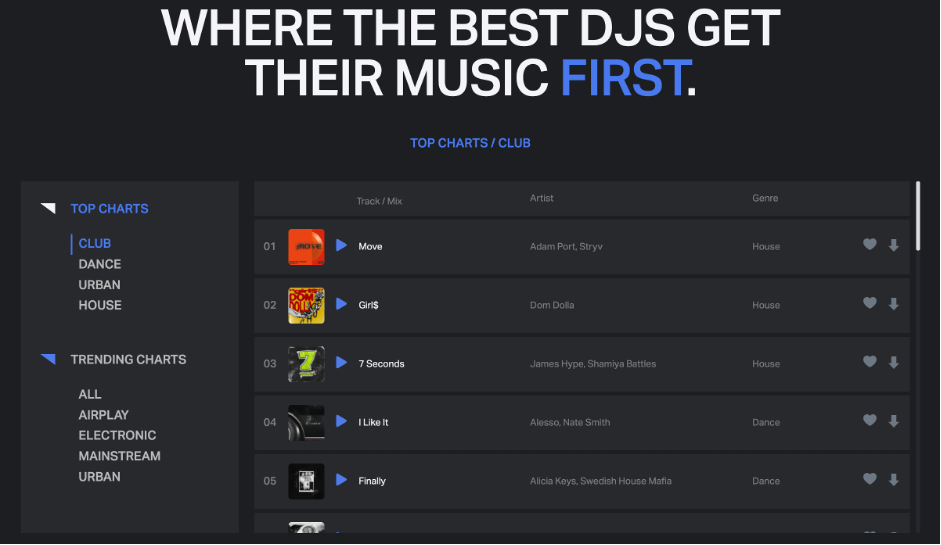
Digital DJ Pool
Digital DJ Pool caters to DJs across multiple genres with a stronger focus on clean edits and radio versions rather than into/outro versions. One of Digital DJ Pool’s key distinguishing features is its social media-like component. Users can follow other DJs and see what tracks they’re liking, creating a personalized feed of music recommendations. Their mobile app also includes a unique looper function. This tool is particularly useful for turntablists and scratch DJs, providing endless loops at various tempos for scratch practice sessions. With pricing starting at $20/month, Digital DJ Pool is a budget-friendly option for open-format DJs who don’t mind the lack of intro/outro versions.
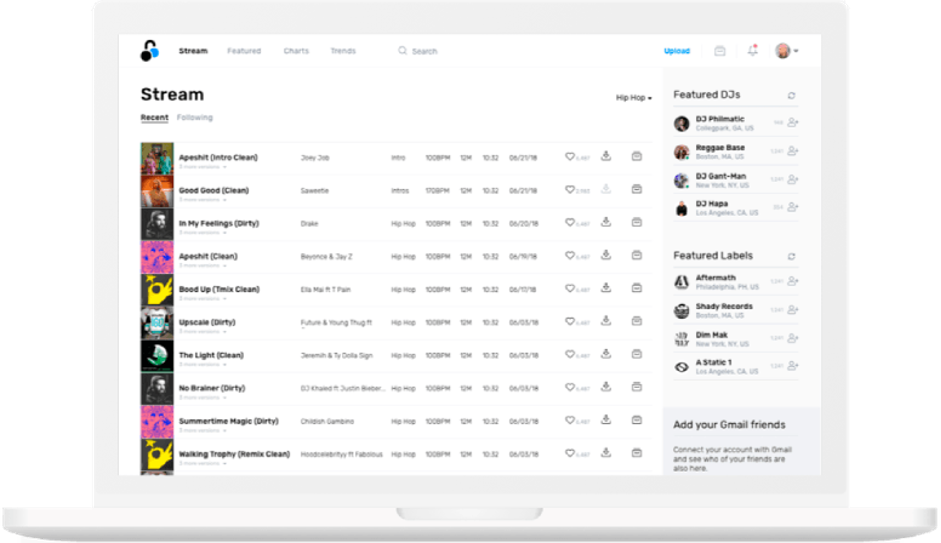
While we’ve covered some of the top record pools in detail, there are several other noteworthy options worth considering: DJcity, Promo Only, MyMP3Pool, Direct Music Service. These record pools each have their unique strengths and cater to different DJ needs. Depending on your specific genre focus and budget, one of these might be a good fit for your DJ toolkit.
Digital Music Stores
While DJ record pools offer a vast selection of tracks and DJ-friendly edits, digital music stores serve as an essential complement to your music sourcing strategy. These platforms typically boast much larger back catalogs, making them invaluable for finding those elusive tracks that might not be available on your record pool. Digital music stores allow you to purchase individual songs or albums, ensuring you have access to a wider range of music, including older releases, niche genres, and specific versions of tracks. Check out some of the top digital music store options that can help you fill the gaps in your collection.
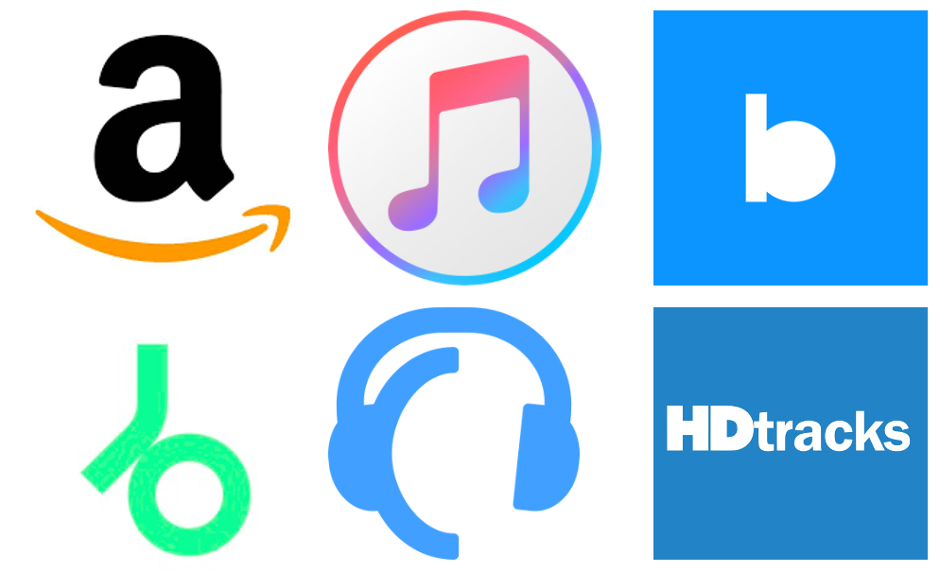
Amazon Music Store
Amazon’s digital music marketplace boasts an impressive catalog of over 90 million songs. Prices generally range from $0.69 to $1.29 per track, with most hovering around $0.99. Songs are typically offered in 256 kbps MP3 format, balancing quality and file size. The store also frequently features discounted albums and competitive pricing. It can be a lifesaver for DJs of any genre.
iTunes Store
Launched in 2003, iTunes revolutionized digital music distribution. With a vast library of over 60 million songs, it offers high-quality, unrestricted tracks typically priced at $0.99-$1.29. Songs are available in 256 kbps AAC format (Apple’s version of MP3), ensuring excellent audio quality. iTunes often offers exclusive content from major artists, and features like iTunes LP for select albums. While no longer the dominant force it once was, iTunes remains a go-to option for many, especially those deeply embedded in the Apple ecosystem.
Beatport
A cornerstone of electronic music, Beatport offers around 9 million tracks focusing on genres such as drum & bass, hard techno, mainstage, trap, and trance. Prices range from $1.29 to $2.99 per track, reflecting its specialized nature. Beatport provides high-quality 320 kbps MP3 files and 16-bit WAV options for audiophiles. Its strength lies in its comprehensive electronic music catalog, genre-specific charts, and early access to new releases. For DJs looking for EDM music, it’s a no-brainer.
Beatsource
Catering specifically to DJs, Beatsource is a joint venture between Beatport and DJcity. While its library is smaller than some competitors, it focuses on curated, high-quality tracks for live performance. Songs typically cost $1.49-$2.49 and are available in 320 kbps MP3 format. Beatsource really comes in handy when searching for DJ edits of songs that aren’t available on your record pool.
Traxsource
Specializing in house music and its subgenres, Traxsource offers a selection of around 5 million tracks. Prices typically range from $1.49 to $2.49 per track, with high-quality 320 kbps MP3 files as standard. What sets Traxsource apart is its focus on underground and emerging artists, often featuring exclusive content not found on larger platforms. Its “Hype Charts” and DJ Top 10 lists provide insights into trending tracks within the house music scene, making it a favorite among house music DJs and aficionados.
HDtracks
For audiophiles seeking the ultimate in digital audio quality, HDtracks is the go-to destination. While its library is smaller than mainstream stores, it offers a wide range of genres in stunning high-resolution formats. Tracks are available in 24-bit/192kHz FLAC, ALAC, WAV, and AIFF formats, far surpassing CD quality. Prices are higher, typically $2.49-$3.98 per track, reflecting the premium audio quality.
Music Streaming Services
Next up, let’s explore the world of DJ-friendly music streaming services. Unlike record pools that provide downloadable content or digital stores where you purchase tracks, streaming services offer instant access to vast libraries without the need for downloads. This flexibility allows DJs to discover and play new music on the fly, but it’s important to note that a reliable internet connection is essential, and you don’t own the music – you’re renting access.
In this section, we’ll explore the top music streaming services compatible with DJ software, highlighting how they can enhance your performances and broaden your musical horizons.
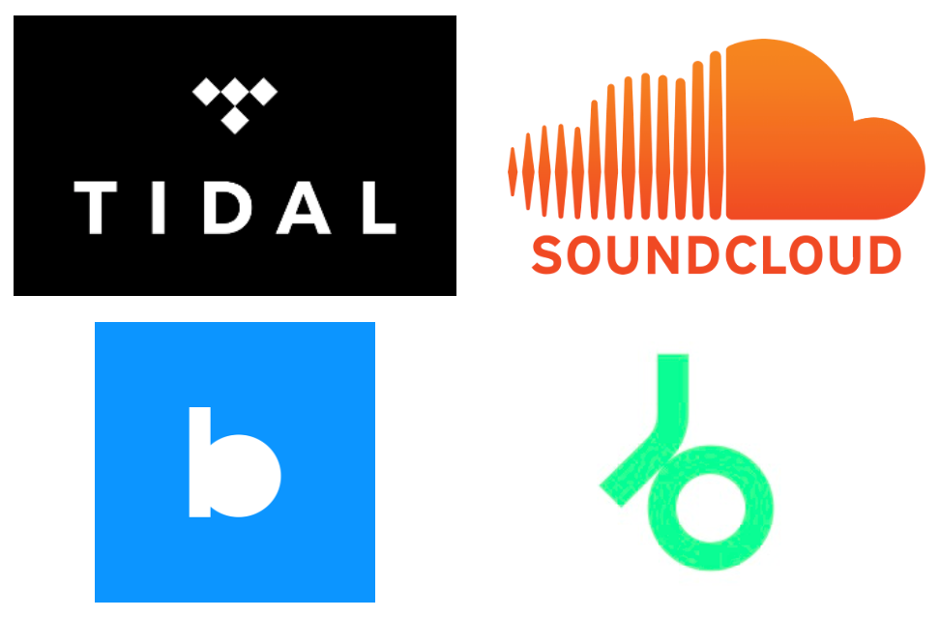
Tidal
Tidal offers over 110 million tracks in high-fidelity audio, including lossless and Dolby Atmos formats. Compatible with Serato, rekordbox, and Traktor, Tidal’s DJ integration starts at $19.99/month. Its offline mode allows downloads on mobile devices for mixing without internet. What sets Tidal apart is its HiFi Plus tier, providing master-quality audio, and exclusive content like artist-curated playlists and live streaming sessions. For audiophile DJs who prioritize sound quality and premium content, Tidal’s extensive library and high-res audio make it a top choice in the streaming world.
Beatsource LINK
Beatsource LINK boasts over 10 million tracks focused on hip-hop, pop, and dance music. It integrates seamlessly with Serato, Rekordbox, Traktor, VirtualDJ, and other software. Following a 30 day free trial, subscriptions start at $12.99/month increasing to $34.99/month for the Pro+ plan. Beatsource LINK Pro+ includes DJ edits and offline mode, allowing DJs to play up to 1000 tracks without internet. Beatsource LINK’s strong emphasis on mainstream and urban genres make it ideal for open-format DJs.
Beatport LINK
Beatport LINK, with over 9 million tracks primarily in electronic music, is compatible with rekordbox, Traktor, Serato, and more. Subscriptions start at $14.99/month, with higher tiers offering offline storage for mixing without internet. Beatport distinguishes itself with genre-specific curation, exclusive content from underground labels, and the LINK Playlists feature for cross-device setlist preparation. Its extensive electronic music catalog, coupled with features tailored for club DJs, makes Beatport LINK an essential tool for those specializing in dance and electronic genres.
SoundCloud Go+
SoundCloud Go+ provides access to over 320 million tracks, including a vast array of user-uploaded content, for $9.99/month. It’s compatible with Serato, Virtual DJ, and others, offering a unique blend of mainstream and independent music. While it lacks a traditional offline mode for DJ software, users can save tracks for offline listening within the app. SoundCloud’s strength lies in its diverse, often unreleased tracks from emerging artists, making it invaluable for DJs seeking cutting-edge and underground music not found on other platforms.
Free Music
While free music sites may not provide a comprehensive library for serious DJs, they can be a useful resource for those looking to experiment or practice without spending money. These platforms offer a selection of tracks that can help you get familiar with your equipment and develop your skills. However, the variety and quality may be limited, making them better suited for casual use rather than as a primary source. Still, they deserve a mention for anyone looking to dip their toes into the world of DJing without financial commitment. Let’s take a look at some options!
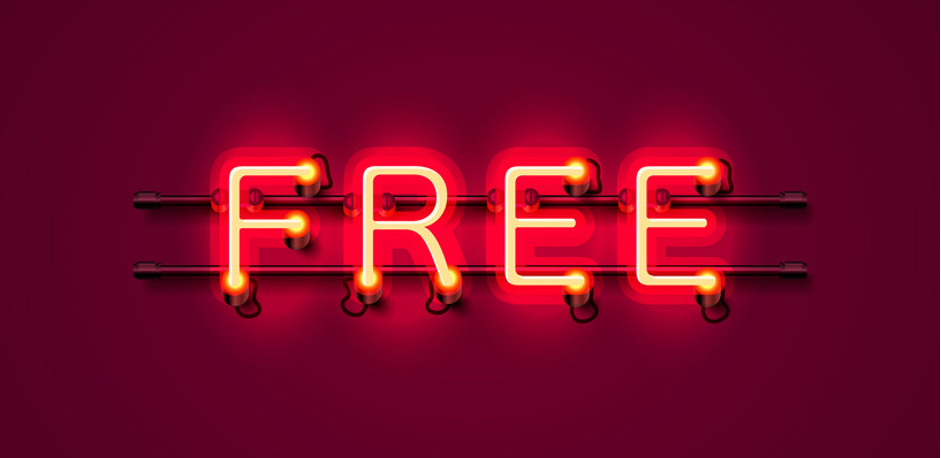
SoundCloud
A popular platform where both emerging and established artists share their music, SoundCloud is a gold mine for DJs seeking off-the-grid tracks and remixes. Many artists offer free downloads, making it easy to discover unique sounds. The community-driven nature fosters collaboration and creativity, allowing DJs to connect with others while exploring a diverse range of genres.
Bandcamp
This platform allows artists to sell their music directly to fans and often features free or “pay-what-you-want” options. Bandcamp is ideal for DJs seeking high-quality files and direct connections with independent musicians. Its extensive collection spans multiple genres, making it a great place to find unique tracks that stand out in any set.
Jamedo
Known as one of the largest legal sources for free music, Jamendo offers a vast library of tracks under Creative Commons licenses, allowing for easy distribution. It focuses on independent artists, making it an excellent resource for discovering hidden gems. Users can create playlists and engage with the artist community, providing a unique experience for DJs looking for fresh material.
Free Music Archive (FMA)
FMA provides a massive catalog of pre-cleared tracks across various genres, ensuring legal use for DJ gigs. With 16 categories to explore, it’s user-friendly and doesn’t require an account to start downloading. While it may take some digging to find standout tracks, the variety available makes it a valuable resource for DJs.
Physical Music
In a digital world, physical music formats like vinyl records, CDs, and even cassette tapes still hold a special allure for DJs and music lovers alike. These formats not only provide a rich, warm sound but also grant access to tracks that may not be available in digital form. Plus, they can be easily ripped into digital formats, allowing for versatile use in your DJ sets. Popular online platforms like Discogs, HMV, Juno Records, and Amazon offer extensive catalogs of physical music, making it easier than ever to explore and acquire these tangible treasures. DJs, don’t sleep on this option when building your music libraries – the unique sounds and rare finds available in physical formats could be the secret weapon that distinguishes your performances from the rest.

Conclusion
As we’ve explored in this comprehensive guide, the world of DJ music acquisition is a diverse topic. The challenge of building and maintaining a top-notch music library is hard work, but the key lies in understanding and efficiently leveraging the various options available to you.
Record pools emerge as the cornerstone of a DJ’s arsenal, offering a cost-effective way to keep your library fresh and relevant. For open format DJs, BPM Supreme stands out as an excellent choice, and don’t forget to use our exclusive code “Deftdj” for a 25% discount on your first month. If you want to specialize in certain genres, consider specialized pools like FRP for hip-hop or ZIPDJ for EDM.
Digital music stores serve as valuable supplements, allowing you to fill the gaps in your collection. However, if you find yourself frequently purchasing individual tracks, it might be time to reassess your record pool subscription.
While streaming services come in handy for unexpected song requests, they come with the caveat of reliance on internet connectivity and the risk of losing access to your curated playlists. Use them wisely as a discovery tool, but don’t let them become your sole source.
And let’s not forget the enduring charm of physical formats. Vinyl records and CDs not only offer a tactile connection to the music but can also be digitized to enhance your digital library, bridging the gap between old-school cool and modern convenience.
The key to success lies in crafting a strategy that combines these resources effectively. Start with a solid record pool subscription, supplement with digital purchases when necessary, use streaming for discovery, and sprinkle in some physical formats for that extra touch of authenticity.
Remember, your music collection is the lifeblood of your DJ career. It’s what sets you apart, defines your style, and keeps your audience coming back for more. By leveraging the insights from this guide, you’re now equipped to build a library that’s not just extensive, but also uniquely yours!
Tell us your favorite DJ music sources in the comment section below!
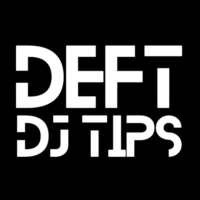
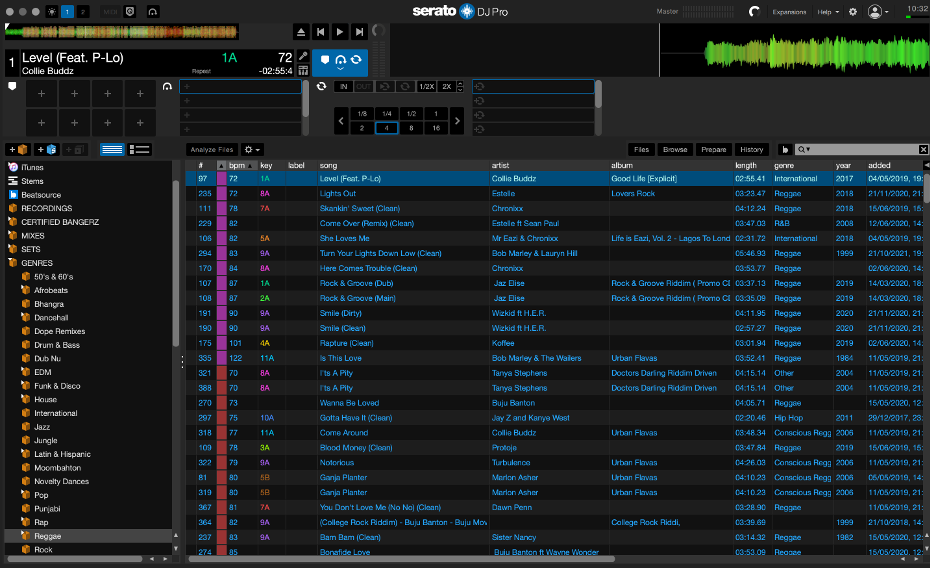


Extremely helpful and comprehensive guide. Thanks!
Hey Scratchnewby. We’re glad that we could help you on your DJ journey. Stay tuned for much more helpful content!